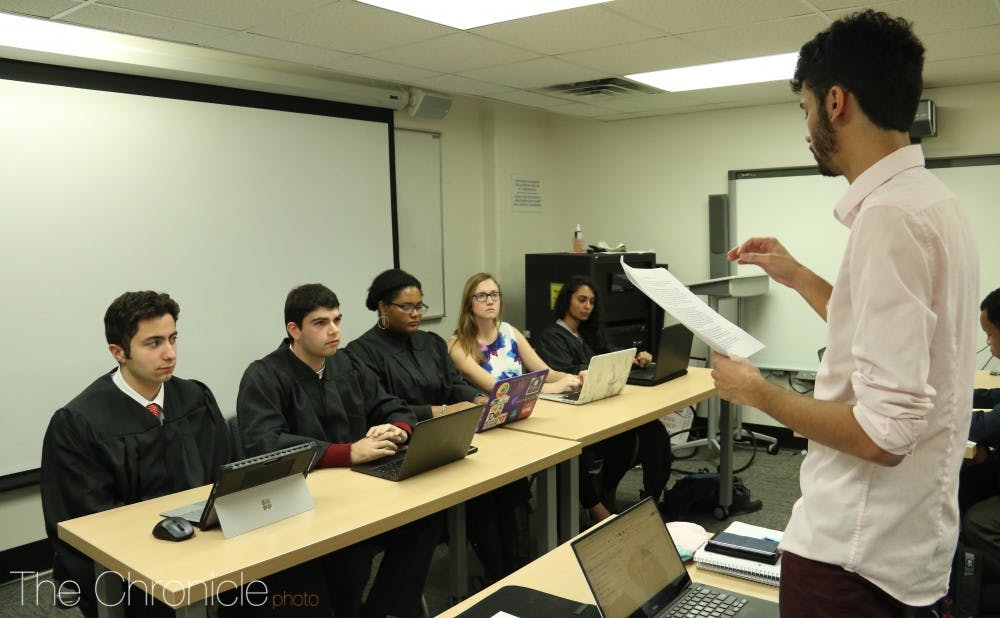In an unanimous decision, the Duke Student Government Judiciary ruled in favor of DSG after a challenge to the Senate by Hyde House Thursday evening.
Five justices of the DSG Judiciary heard arguments from the Hyde House, a selective social group challenging the DSG Senate's decision not to charter the group, dragging the "selective social group" saga into a third month. Hyde House argued that the Duke Student Government Senate "arbitrarily" chose not to recognize Hyde, and asked Judiciary for a second chance in front of the Senate.
A full opinion will be issued by the Judiciary later.
Hyde House was represented by senior Tyjair Sadler, a member of the Office of Public Advocacy. OPA was established by the DSG Judiciary during the 2017-18 academic year. Sadler is also a member of The Chronicle's independent editorial board.
President Pro Tempore Avery Boltwood, a junior, represented the Senate. The five justices who heard the case were led by Chief Justice Analese Bridges, a senior. The other justices were senior Alex Murphy, senior Michael Brunetti, sophomore Anjali Kunapaneni and first-year Achilles Dabrowski. Kunapaneni and Dabrowski were confirmed by the DSG Senate last week.
Hyde House's petition criticized the Senate's lack of "quantifiable procedure" in exercising its discretionary power to charter student organization. The petition also argued that "Senate procedures [were] conducted in an arbitrary manner," violating Hyde House's right of due process under the DSG Constitution.
The petition cited Section 2 of Title III of the Student Organization Finance Committee bylaw and Sections 7 and 9 of Article IX of the DSG Constitution as legal backing for its claims.
Hyde House's petition called for the group to be given a new, "fair" debate in front of the Senate.
Much of the hearing focused on the role of discretion in the Senate's decision making concerning student organizations.
Sadler focused on what he described as "inconsistencies" in the Senate's deliberation process, which resulted in organizations that met similar criteria to Hyde House being chartered by DSG, but Hyde House not being chartered.
He compared provisions of the Hyde House's constitution to those of other organizations chartered by the Senate and argued that Hyde House met or exceeded standards that the Senate had previously used to charter other student organizations.
According to Sadler, these inconsistencies violated Hyde House's right to due process and demonstrated that the current DSG Constitution is too vague to meet the standards of the DSG Bill of Rights.
However, Sadler argued that the issue in front of the Judiciary was broader than Hyde House's case alone. Instead, he argued that the arbitrary nature of the test that the Senate uses, laid out in the SOFC bylaw, violated the rights of student organizations.
In particular, he singled out the provisions calling for the Senate to use its discretion to determine whether student groups should be chartered.
"The arbitrariness of their discretionary opinion harms student organizations," Sadler said.
Although Sadler focused on issues with the DSG Constitution throughout his arguments, he stopped short of calling for Judiciary to mandate a change to the Constitution when pressed by the Justices. Instead, he called for a new, "fair" Senate debate on the group's chartering.
Sadler did not describe potential "measurable and quantifiable" standards for new student groups, instead leaving that power to the Senate. He argued that the Senate's position in DSG leaves it with the responsibility to develop those tests in order to satisfy the Bill of Rights.
Boltwood argued that the Senate's discretion and use of broad standards are necessary to ensure that the Senate can express the student body's interests. He made the case that Senate must inevitably retain some discretion over student organizations, even if the list of clear standards for new group were expanded.
"Even if we have an enumerated test there will still be a point where you can't capture everything," Boltwood said.
Boltwood also pushed back against claims that the Senate's subjectivity makes its decisions arbitrarily. He described discretion as vital to the Senate's ability to adjust to both different student groups and changing opinions of the student body. He argued that a set of fixed standards for recognition could hurt the Senate's ability to adapt over time.
Get The Chronicle straight to your inbox
Sign up for our weekly newsletter. Cancel at any time.
"A set standard would seem to promote a certain kind of thinking about student organizations," Boltwood said.
Boltwood explained that the Senate followed routine procedures during the debate over chartering of the Hyde House. He pointed to robust debate on the Senate floor as evidence that the Senate had carefully considered Hyde House's chartering.
Dabrowski questioned whether Sadler's criticisms of the Senate's discretionary role would lead to the Judiciary acting as a final, neutral arbiter in every case in front of the Senate. Sadler argued that Senate could remain the final decision maker, so long as they abided by a revised set of objective criteria.
At one point, the Justices asked Sadler whether Hyde House's request for a new Senate debate on chartering would lead to any chance of success for the group and Sadler expressed faith in the Senate's ability to fairly debate the group. After the hearing, Sadler was skeptical of the Senate's ability to conduct fair debate under its current rules.
"As the [DSG] Constitution stands right now, I do not believe that the Senators are able to come to a fair hearing," Sadler said.
Boltwood also expressed concerns after the hearing about a new debate on Hyde House, but emphasized that he believes that he could maintain respectful debate and proper procedure in the event of a new debate.
"I think at this point [Senators] would be potentially biased against Hyde House, given that we've gone through this," Boltwood said after the hearing.
Carter Forinash, Trinity '21, was the news editor for The Chronicle's 116th volume.

